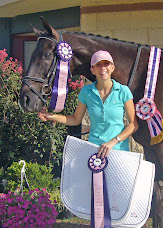Many horse owners intend to keep their horse "forever." This is a wonderful intention, and I personally love to sell my horses to "forever" homes. But what happens when those plans go awry? They can and certainly do all the time: financial stress, a divorce, a move out of the country, sickness, or the death of the horse owner can leave the "forever horse" out of luck with no place to call home. The grieving family members (often of the "non-horseperson" variety) are left wondering what to do with this big, expensive, time-consuming animal.
Having a back-up plan for your horse is essential in the events of a catastrophe described above, but there is more you can do to ensure the best possible life for your horse: take time to place yourself into a prospective new owner's shoes. How can you make your horse more desirable to the kind of the owner you would like to see him go to if you couldn't take care of him anymore? You need to consider him or her as sales prospect. Here's a few tips for making the most of your horses value:
1) Keep a neatly organized binder with all your horses information, health cards, registries, show records, etc... in one place in the house and let the people close to you know about it and where to find it.
2) Do some quick and dirty research on the state of the horse market and draw some comparables (horses currently for sale that are close in age, height, breed, ability, health and experience to your horse). Try http://www.dreamhorse.com/, http://www.warmbloods-for-sale.com/, http://www.equinenow.com/ or similar websites. At least once a year, print some comparables and stick them in the binder.
3) Brainstorm about your horses best qualities and how you can showcase these in way that can be documented. If your horse is already showing regularly, you've got the show record. But even if you and your horse aren't the competitive type, think about doing something at least once a year that demonstrates to potential buyers that your horse was healthy, sane and happy. "He went, he did, he was good." Your horse will be more well-rounded and versatile if he gets off the farm every now and then. Competitive Trail Rides, clinics, small schooling shows in the discipline of your choice - any of these activities are great for documenting value.
4) Take a video or some pictures of your horse at least once a year. It doesn't have to be perfect, but it should showcase the horses best abilities and be shot in a pleasant, well-lit location. A good stand-by location is a well-kept, green pasture with an uncluttered background on a sunny day with the photographer's back to the sun. Put the best picture(s) in the binder.
5) Keep up with the "little" things: mane-pulling (if it suits the breed), curry regularly for a shiny coat, trim up the fetlocks and keep the tail moisturized to encourage growth and keep breakage to a minimum. For geldings, regular sheath-cleaning is an often over-looked part of the grooming routine.
6) X-Rays: Depending on your horse's worth, you might consider getting a standard set of X-rays (3-view for lower legs and hooves, and hocks) every few years. With the digital machines, the vet can give you a disk or email you a file of the X-rays to keep on hand. In addition to tracking the health of the joints, you can see ahead of time if a blemish on the X-rays will affect your horses value in the event of a sale. X-ray interpretation is not a cut-and-dry thing, so always consider a second or third opinion in the case of a "doom-and-gloom" reading. Regular X-rays can also be helpful for your farrier.
7) Manners: Try to make sure your horse has the basic qualities of a "Good Citizen" or work to improve them. Ideally, he should respect the space of humans, tie, clip, load, cross tie quietly for grooming, tacking, a bath or the farrier, ride outdoors or in, hack out alone or with a group, and be able to be ridden safely in new environments (such as a show). Any behavioral or stable vices will reduce value!
Some portions of the above probably seem obvious, some are! But it's an important reminder not to take your horse for granted, since doing so will certainly make him seem less desirable if you or an unsuspecting family member suddenly has to find him a new home.







